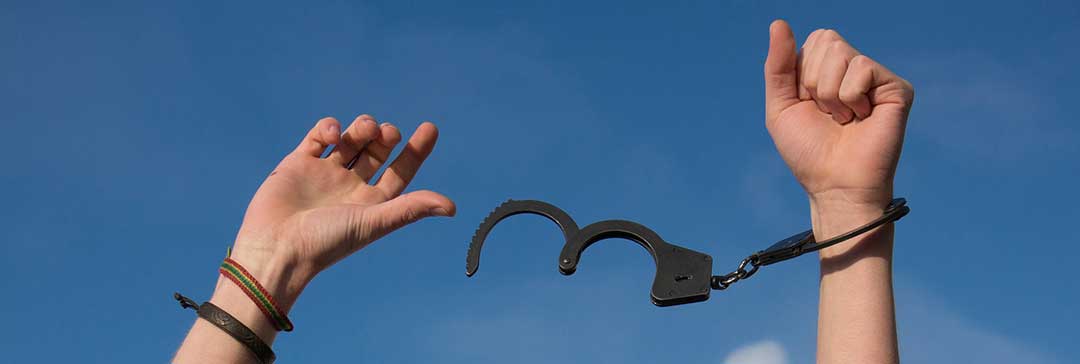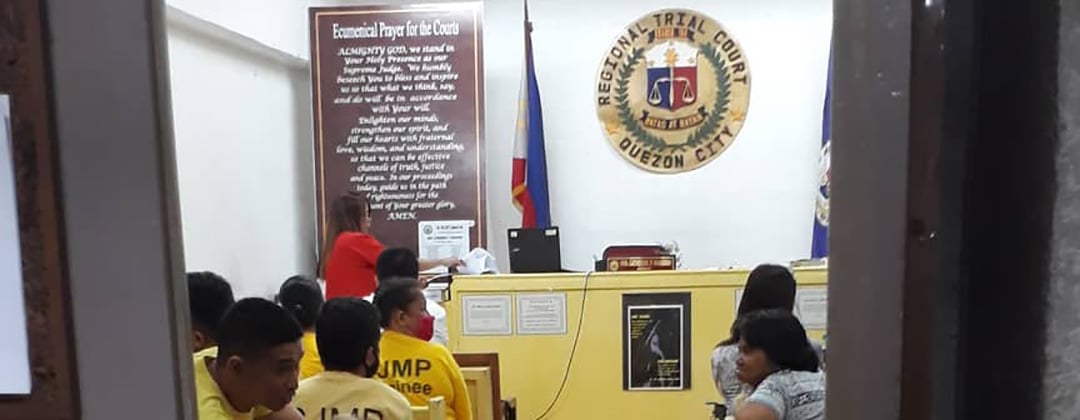The Trial Court’s inherent authority to dismiss a criminal case
Trial Courts can dismiss criminal cases if they determine that these should not go on to trial.
Jurisprudence is clear that the power of disposition over a criminal case — such as its continuation or its dismissal or the exclusion of an accused — is reposed in the sound discretion of the trial court.

The trial court controls the disposition of a criminal case.
Both under the Constitution (Section 2, Article III) and the Rules of Court (Section 6, Rule 112), the Trial Court — after a Complaint or Information has been filed with it — has the power to determine the existence or absence of probable cause. And, if there is, to issue the corresponding warrant of arrest. Conversely, if there is no probable cause to hold the accused of trial, the Court has the power to outrightly dismiss the Complaint/Information.

Without probable cause, the court can dismiss a criminal case.
The Supreme Court has discussed what is meant by probable cause in terms of what is reasonable and based on prudence and common sense in the case of Webb vs. De Leon, G.R. No. 121234, August 23, 1995:

Arrests must have probable cause otherwise it is a violation of the Bill of Rights.
The need to find probable cause is dictated by the Bill of Rights which protects “the rights of the people to be secure in their persons. . . against unreasonable searches and seizures of whatever nature . . . “An arrest without probable cause is an unreasonable seizure of a person and violates the privacy of persons which ought not to be intruded by the State. Probable cause to warrant arrest is not an opaque concept in our jurisdiction. Continuing accretions of case law reiterate that they are facts and circumstances which would lead a reasonably discreet and prudent man to believe that an offense has been committed by the person sought to be arrested. Other jurisdictions utilize the term man of reasonable caution or the term ordinarily prudent and cautious man. The terms are legally synonymous and their reference is not a person with training in the law such as a prosecutor or a judge but to the average man on the street. It ought to be emphasized that in determining probable cause, the average man weighs facts and circumstances without resorting to the calibrations of our technical rules of evidence of which his knowledge is nil. Rather, he relies on the calculus of common sense of which all reasonable men have abundance. (Boldfacing supplied).
These standards require that a finding of probable cause must be reasonable and have the basis in order to justify going on with a criminal trial.

The Supreme Court has upheld this in its decisions.
Illustrative is the case of Salonga vs. Cruz-Pano, G.R. No. L-59524 February 18, 1985, where the Supreme Court ruled that where there was no prima facie case against a person sought to be charged with a crime, the judge or fiscal, therefore, should not go on with the prosecution in the hope that some credible evidence might later turn up during trial, for this would be a flagrant violation of a basic right which the courts are created to uphold. The Supreme Court declared in Salonga that :
It is therefore, imperative upon the fiscal or the judge as the case may be, to relieve the accused from the pain of going through a trial once it is ascertained that the evidence is insufficient to sustain a prima facie case or that no probable cause exists to from a sufficient belief as to the guilt of the accused. Although there is no general formula or fixed rule for the determination of probable cause since the same must be decided in light of the conditions obtaining in given situations and its existence depends to a large degree upon the finding or opinion of the judge conducting the examinations, such as finding should not disregards the facts before the judge nor run counter to the clear dictates of reasons (See La Chemise Lacoste, S.A. v. Fernandez, 129 SCRA 391). The Judge or fiscal, therefore, should not go on with the prosecution in the hope that the credible evidence might later turn up during the trial for this would be a flagrant violation of a basic right which the court is created to uphold. It bears repeating that the judiciary lives up to its mission by vitalizing and not denigrating constitutional rights. So it has been before. It should continue to be so. Mercado v. Court of First Instance of Rizal, 116 SCRA 93). (Boldfacing supplied)
In the leading case of Crespo vs. Mogul, G.R. No. L-53373, 30 June 1987, 151 SCRA 462, 469-470, lately reiterated in Baltazar vs. Chua, G.R. 177583, 27 February 2009, the Supreme Court further ruled that once an Information is filed in court, the disposition of said case lies in the discretion of the trial court. Baltazar vs. Chua discussed the doctrine thus:
“The rule is that once an information is filed in court, any disposition of the case, be it dismissal, conviction, or acquittal of the accused, rests on the sound discretion of the court. Crespo v. Mogul laid down this basic precept in this wise:
The rule therefore in this jurisdiction is that once a complaint or information is filed in Court any disposition of the case as [to] its dismissal or the conviction or acquittal of the accused rests in the sound discretion of the court. Although the fiscal retains the direction and control of the prosecution of criminal cases even while the case is already in court he cannot impose his opinion on the trial court. The court is the best and sole judge on what to do with the case before it. The determination of the case is within its exclusive jurisdiction and competence. A motion to dismiss the case filed by the fiscal should be addressed to the Court who has the option to grant or deny the same.
In observance of the tenet spelled out in Crespo, the Court in Martinez v. Court of Appeals lamented the trial court’s grant of the motion to dismiss filed by the prosecution, upon the recommendation of the Secretary of Justice, as the judge merely relied on the conclusion of the prosecution, thereby failing to perform his function of making an independent evaluation or assessment of the merits of the case.
Crespo and Martinez mandated the trial courts to make an independent assessment of the merits of the recommendation of the prosecution dismissing or continuing a case. This evaluation may be based on the affidavits and counter-affidavits, documents, or evidence appended to the information; the records of the public prosecutor which the court may order the latter to produce before the court; or any evidence already adduced before the court by the accused at the time the motion is filed by the public prosecutor. Reliance on the resolution of the Secretary of Justice alone is considered an abdication of the trial court’s duty and jurisdiction to determine a prima facie case. While the ruling of the Justice Secretary is persuasive, it is not binding on courts. The trial court is not bound by the Resolution of the Justice Secretary, but must evaluate it before proceeding with the trial.
Considering that the trial court has the power and duty to look into the propriety of the prosecution’s motion to dismiss, with much more reason is it for the trial court to evaluate and to make its own appreciation and conclusion, whether the modification of the charges and the dropping of one of the accused in the information, as recommended by the Justice Secretary, is substantiated by evidence. This should be the state of affairs, since the disposition of the case — such as its continuation or dismissal or exclusion of an accused — is reposed in the sound discretion of the trial court.”
In the earlier landmark case of Crespo, the Supreme Court further ruled:
“In order therefor to avoid such a situation whereby the opinion of the Secretary of Justice who reviewed the action of the fiscal may be disregarded by the trial court, the Secretary of Justice should, as far as practicable, refrain from entertaining a petition for review or appeal from the action of the fiscal, when the complaint or information has already been filed in Court. The matter should be left entirely for the determination of the Court.”
These cases clearly recognize the power of Trial Courts to dismiss criminal cases filed before them by the Prosecution.






Can probable cause be determined based on circumstantial evidence alone?
Here’s our situation, our house got robbed. And after we assessed the incident, we observed that only specific rooms were searched as if the robber knew that important articles were stored there. Indicating that the robbers know their way around the house.
They even know where the breakers were located and turned it off to render all cctvs useless.
This is something that can be accomplished by a person who has personal knowledge of how the house works.
And on the day of the commission of the felony, my sister and her drug addict husband happen to be within the vicinity of our house per eyewitness account. They also have personal knowledge of how the house works because they lived with us for 4 years before they left.
They also shown that they’re in dire need of financial resources kasi wala na sila pambili ng needs ng mga anak nila.
And finally, her husband is a reputed drug addict because even their family patriarch is aware of this.
Should the eyewitness refuse to cooperate in fear for her safety, can we still establish probable cause or a prima facie case against them based on the above-mentioned circumstances?
Evidence placing them on the scene would probably be necessary.
can a case be dismiss due to wrong date indicated in the inquest resulotion?
You’d have to look at the specific circumstances of the case. However, in certain cases, the Court has allowed simply amending the Information filed to reflect the correct date. See Gabionza vs. Court of Appeals.
I’m not sure if you can answer my question, but I hope so.
I discovered my wife involved in an incestuous relationship with her nephew. He fled the country and I filed an adultery case against her.
Meanwhile, she filed an R.A.9262 complaint against me – claiming that I was the one who forced her to do it. I am on trial now.
First: She has absolutely no evidence what so ever to back up this amazing accusation.
Second: When she testified, she made up a story alleging that I was present, but forgot to implicate me in any wrongdoing. In her testimony, she felt pressured by her nephew and said I was there but not doing or saying anything. She then claims she gave her consent and let him have sex with her while I supposedly stood by saying and doing nothing.
As, in her testimony, I did not threaten, force, intimidate, or coerce, I think she has indicated that I didn’t commit a crime.
The truth is that I wasn’t there. I found out and complained against her first. This is a nightmare.
With her testimony that I didn’t do anything, can the defense move for dismissal of the case due to lack of probable cause? It’s a stupid case, but it’s expensive and time consuming. I want it off my shoulders.
…and no, she didn’t make a case against her nephew whom she claims pressured her into sex, but only me on the notion that I stood by. Grrrr
Thank you in advance for your time.
Hi David,
It depends on what stage the case is at now. If this statement of hers was given before trial commenced and trial proper has not yet begun, your defense counsel can ask for dismissal based on probable cause. But if she made this as part of her testimony on the witness stand in open court, that means that trial is well advanced. What you can do in that case is ask for leave to file a demurrer to evidence.
This is to ask the court for permission to file a demurrer — essentially file an argument that, given the inadequacy of the prosecution evidence, your constitutional presumption of evidence was not overturned and you are not even obliged to present evidence in your defense in order to be acquitted.
You should bring this up with your lawyer as there is a time window. The motion for leave to file demurrer needs to be filed promptly after her side finishes presenting evidence or else you will no longer be allowed to file one and will have to go on with presenting your defense evidence.
Thank you.
Yes, it was during her testimony. I just get nervous sometimes because my attorney’s MCLE number is 0003. He’s clever, but has first hand knowledge of Spanish occupation.
God bless